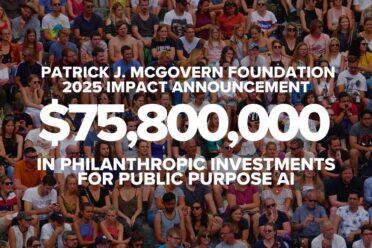New grants target climate action and digital health
BOSTON, Jan. 21, 2021 –The Patrick J. McGovern Foundation has awarded $4.6 million in new grants for innovative data- and AI-driven approaches to health care and climate action.
“Solving the global challenges of climate change and health inequities will require new approaches and tools,” said Foundation President Vilas Dhar. “We’re excited by the ways in which these organizations are using data and artificial intelligence to ensure healthier communities and enable us to be better stewards of our planet.”
The 14 grants reflect the Foundation’s commitment to strengthening data science and AI capacity within social change organizations. Often, Dhar said, non-profit organizations collect valuable data that sheds light on complex problems, and with additional resources they can better leverage data and AI for greater impact. “We are looking forward to a shared learning journey with these new grant partners to understand how the nonprofit sector can be better positioned to use such tools for social change,” Dhar said.
The climate change grants support leading environmental organizations in their efforts to more effectively harness climate data, develop innovative conservation technologies, and leverage AI to accelerate their work.
Climate change
Environmental Defense Fund to support the development of an AI-generated database to map global oil and gas infrastructure allowing quantification of methane emissions as part of the MethaneSAT mission. ($250,000)
World Resources Institute to support the Data Lab’s goal of strengthening the capacity of WRI’s global network to execute data for impact strategies through AI and open data, modernized data infrastructure, workforce development, and technology services. ($500,000)
Tech Matters to build and launch Terraso, a digital platform for integrated landscape management that will help communities to plan and finance sustainable economies by providing data and software tools to monitor progress. ($500,000)
Conservation International to support the development of conservation technologies and to catalyze access to conservation technologies among indigenous people and local communities. ($500,000)
WattTime to support their work to promote emmissionality as a method for measuring the incremental benefit of renewable energy based on location and to expand research and public outreach to drive lower emissions. ($250,000)
Digital Health
Digital Square (PATH) to support the Central American Health Informatics Network (RECAINSA), which will strengthen the network’s governance, build out digital health training, and promote exchange of medical knowledge and experience in Latin America. ($90,000)
Babson College to support a global health care entrepreneurship exchange, enabling cross cultural exchange and data-driven healthcare entrepreneurship in LMICs in partnership with the University of Global Health Equity in Rwanda. ($100,000)
Khushi Baby to support the development of a data system and machine learning model to improve maternal and child health care for families across India, and to assist with the prediction of disease outbreaks and prioritization of COVID-19 vaccine roll-out in Rajasthan. ($100,000)
Instituto Protea to develop capabilities for early diagnosis of breast cancer with the Brazilian population in the most underserved area of the city of São Paulo, using an AI-driven approach. ($150,000)
Himalayan Cataract Project to support a case study to drive quality improvements in cataract surgical services through the testing, monitoring and application of standardized cataract-related data, informing the creation of a global data standard. ($500,000)
Global Digital Health Network to support their work to increase collaborations, knowledge-sharing, and promotion of best practices between those working in digital health worldwide. ($200,000)
Child’s Play to support the growth of the Pediatric Gaming and Technology Specialist program to improve the lives of children in long-term inpatient care. ($150,000)
UCSF Neuroscape for the development of Nexus, a platform that allows for large-scale collection, analysis and visualization of data to discover and build interventions for assessing and improving brain function. ($150,000)
The Trinity Challenge to support the launch of a coalition that aims to improve global preparedness and data-driven response to future health emergencies. ($1.2 million)


